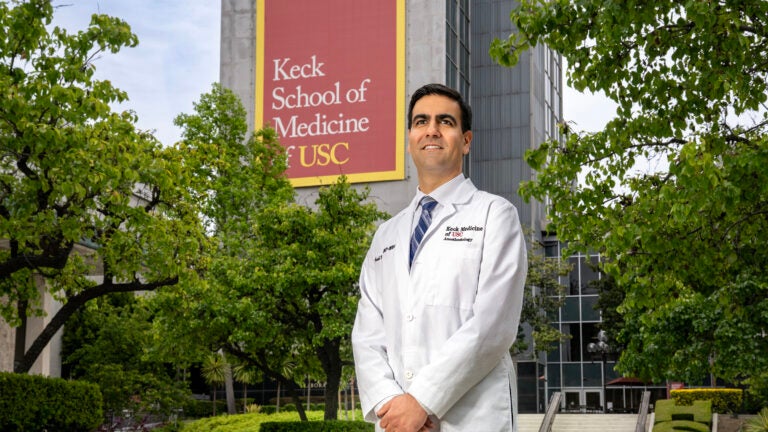
Arash Motamed is Keck Medicine of USC’s first medical director of sustainability, but he began spearheading sustainability initiatives well before he assumed that title in 2022. (USC Photo/Gus Ruelas)
‘Greening’ the operating room: Arash Motamed
As the medical director of sustainability at Keck Medicine of USC, Associate Professor Arash Motamed is working to reduce the harmful effects of clinical operations on the environment.
USC Trojan Family Magazine is featuring Trojans who have made a significant difference in sustainability at the University of Southern California.

For anesthesiologist Arash Motamed, the operating room isn’t just a site for extraordinary patient care. It’s also a setting where subtle changes can lead to significant benefits for the environment.
In everything from the gases used to anesthetize patients to the instruments employed by surgeons and anesthesiologists, Motamed sees opportunities to “green” the OR.
Motamed is Keck Medicine of USC’s first medical director of sustainability, a position he formally began in December 2022. But Motamed — who is also a clinical associate professor and vice chair of clinical operations for the department of anesthesiology at the Keck School of Medicine of USC and medical director for operating rooms at Keck Hospital of USC — began spearheading sustainability initiatives well before he assumed that title.
When USC President Carol Folt began her tenure in 2019, Motamed was excited by her focus on lowering the carbon, water and waste footprints of USC campuses. He advocated to create a role that would coordinate these efforts at Keck Medicine with a clinical point of view.
Motamed’s sustainability accomplishments in the ensuing years paved the way for the role he now officially fills. “I got to create my own job description,” says Motamed, a three-time Trojan with degrees from the USC Dornsife College of Letters, Arts and Sciences, the Keck School of Medicine and the USC Marshall School of Business.
A nature lover, Motamed is motivated by his care for the planet’s well-being and his zeal for innovation. Viewing patient care through the lens of sustainability “gives me an opportunity to reexamine everything that we do,” he says.
Eliminating harmful anesthetic gases
Motamed spearheaded Keck Medicine’s decision in December 2022 to discontinue desflurane, a commonly used but environmentally harmful anesthetic gas. In early 2021, he launched an initiative to phase out the potent greenhouse gas, which traps heat in the atmosphere and contributes to climate change. He championed a switch to sevoflurane, an anesthetic that is less harmful to the environment, less costly and less irritating to patient airways.
To promote the transition to sevoflurane, Motamed removed desflurane canisters from anesthesia machines at Keck Hospital and stored them in his office, where they were available to any anesthesiologist who completed a sign-out sheet. “Over the next few months, one person came in and signed desflurane out,” Motamed says. “After that, no one ever came. So, a year later, we told the pharmacy to take it off the hospital’s list of approved medications.”
Motamed next focused his attention on nitrous oxide, another common anesthetic that contributes to global warming and stays in atmosphere about 100 years. In hospitals, nitrous oxide is typically delivered through a central pipeline that is prone to leakage. “Studies show that potentially up to 93% of the nitrous oxide may leak into the environment and doesn’t even reach the patient,” Motamed says.
Similar to the desflurane phase-out strategy, Motamed removed nitrous oxide and gave his peers a number they could call to have a cylinder of nitrous oxide set up for their use. “Within a few months, only one person called for it,” Motamed says.
In 2023, Keck Hospital became the first hospital in the nation to end the use of all forms of nitrous oxide from anesthesia practice. USC Norris Cancer Hospital followed suit in 2024.
Motamed also sought out a software upgrade for Keck Hospital’s anesthesia machines that offers a waste-saving mode for sevoflurane. Since its introduction in fall of 2024, emissions of sevoflurane have been reduced by roughly 50%. “We’ve estimated this reduction in greenhouse gases to be the equivalent of driving around Earth’s circumference about 10 times annually,” Motamed says.
Bolstering teamwork, slashing waste
While his actions have ignited change, Motamed notes that sustainability is not a “one-person job.” He has nurtured collaboration on sustainability improvements by coordinating with other sustainability leaders across USC’s campuses through the Keck USC Sustainability & Healthcare Initiative group and creating the Keck OR Sustainability Team (KOST).
KOST — which includes OR nurses, representatives from perioperative teams, surgeons, anesthesiologists and surgical technologists — meets monthly to discuss ways to make operating rooms more sustainable and less wasteful. “Studies suggest approximately 20% of what we open in the operating room just ends up in the trash without ever touching the patient,” Motamed says.
For example, it was previously common practice for Keck Hospital anesthesiologists to use disposable handles for laryngoscopes, devices that allow them to insert a breathing tube into a patient. These plastic handles, each containing two batteries, were used for just a few seconds before being disposed of. In September 2024, the hospital switched to reusable handles that can be wiped clean. Motamed estimates that 5,000 single-use handles and 10,000 batteries have been spared from disposal since then.
Other waste-reduction initiatives launched by the working group include turning out lights when operating rooms are not in use, curbing the disposal of improper items in biohazard waste bins and removing surgical supplies from sterile packaging only when they are medically necessary.
Motamed hopes these collaborative efforts foster a culture of sustainability in the OR. He’s working to make sustainability “part of everything we do, as opposed to this separate group that’s trying to change things,” he says.
“I want to help create connections and change the culture to essentially make myself irrelevant in this space,” Motamed adds. “If I’m successful in my role as medical director of sustainability, I won’t be doing it in a few years.”



